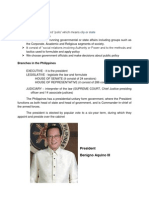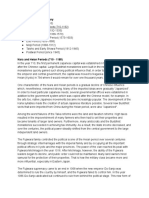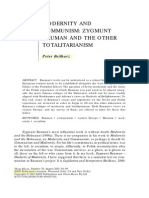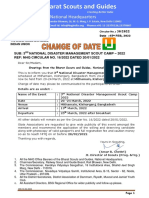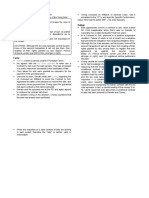Professional Documents
Culture Documents
Quenie Docs
Quenie Docs
Uploaded by
Quenie LatamOriginal Description:
Original Title
Copyright
Available Formats
Share this document
Did you find this document useful?
Is this content inappropriate?
Report this DocumentCopyright:
Available Formats
Quenie Docs
Quenie Docs
Uploaded by
Quenie LatamCopyright:
Available Formats
What is the constitution?
The fundamental principles and laws of a nation, state, or social group that dictate the
government's powers and obligations and guarantee certain rights to its citizens it is
also a written document containing a political or social organization's regulations.
Meaning of Constitution Law?
a set of rules, doctrines, and practices that regulate how political communities operate.
The state has been the most important political community in modern times.
3. The Philippine Constitution may be classified as conventional or enacted, written, rigid or inelastic.
4. As I review the two constitutions, the democratic is 1973 constitution because, the President was
ideally elected as the symbolic and purely ceremonial head of state chosen from amongst the
Members of the National Assembly for a six-year term and could be re-elected to an unlimited
number of terms. Also the good side of this institution are; that executive power was restored to the
President, that direct election of the President was restored, for an executive committee composed of
the Prime Minister and not more than 14 members was created to "assist the President in the
exercise of his powers and functions and in the performance of his duties as he may prescribe;" and
the Prime Minister was a mere head of the Cabinet and for electoral reforms and provided that a
natural born citizen of the Philippines who has lost his citizenship may be a transference of private
land for use by him as his residence.
Lesson 3
1. A type of social or political philosophy in which practical as well as theoretical elements are
emphasized. It is a set of ideas that strives to both understand and transform the world. In
terms of the philosophical, political, and geopolitical circumstances in which ideologies have
arisen, this article examines their nature, history, and relevance. The articles on socialism,
communism, anarchism, fascism, nationalism, liberalism, and conservatism explore specific
types of ideology.
2. Is a constitutional government operates on the bases of specific ideologies. An Ideology
according to Lawson (1989) is a set of doctrines, concepts, and beliefs that lends legitimacy to
the operation of a government and its various. Ideology, according to Dahl (1997), relates to
fundamental beliefs about power, political principles, and the function of government in society.
The ideological roots of the Philippine government are examined in this chapter, which may be
found in the preamble and article II (Declaration of State Politics and Principles) of the 1987
Constitution.
3. The Preamble itself imparts three central concepts to the reader, the source of power to enact
the Constitution. The example of this is the people of the Philippines, the broad ends to which
the Constitution is ordained and established. Lastly, the authors' intent for the Constitution to
be a legal instrument of lasting.
4. The Philippine archipelago, including all islands and waters within it, as well as all other
territories over which the Philippines has sovereignty or jurisdiction, including its terrestrial,
fluvial, and aerial domains, as well as its territorial sea, seabed, subsoil, insular shelves, and
other submarine areas, are all included in the national territory. The waters surrounding,
between, and linking the archipelago's islands, regardless of their breadth and size, are
considered part of the Philippines' internal waters.
5. Territory is particularly significant in international law since jurisdiction, which is a feature of
state sovereignty, is largely exercised on a territorial basis. Also to know that the rights to
property can be coordinated with others' rights, and rendered interpersonally binding, only
when there is a public authority to delineate and enforce their contours.
You might also like
- 439 Quincy Street NW Combined 03-23-2023 ts77468Document21 pages439 Quincy Street NW Combined 03-23-2023 ts77468George Ricky HawkinsNo ratings yet
- (H136) A2-DOCTOR, John RonaldDocument5 pages(H136) A2-DOCTOR, John RonaldXavier Mark BeatingoNo ratings yet
- Stocking Agreement RJR 3-24-00Document2 pagesStocking Agreement RJR 3-24-00api-26225233No ratings yet
- Berkeley County - Subdivision HandbookDocument32 pagesBerkeley County - Subdivision HandbookD AuldNo ratings yet
- G4-Revisiting Corazon Aquino's SpeechDocument33 pagesG4-Revisiting Corazon Aquino's SpeechEdison Ansay83% (12)
- Political Science 2F The Philippine Constitution: An IntroductionDocument22 pagesPolitical Science 2F The Philippine Constitution: An Introductioney_chuaNo ratings yet
- Lacumbo KrislyrDon 2BSEcE-A GE2 Act7Document2 pagesLacumbo KrislyrDon 2BSEcE-A GE2 Act7John BacorayoNo ratings yet
- LESSON 13, 14,15 and 7Document16 pagesLESSON 13, 14,15 and 7isolomonNo ratings yet
- Chapter 4Document11 pagesChapter 4shielaoliveros73020No ratings yet
- Hand-Outs Pol SciDocument6 pagesHand-Outs Pol SciFobe Lpt NudaloNo ratings yet
- A Reading in Philippine History-Topic8Document8 pagesA Reading in Philippine History-Topic8Justine PrudenteNo ratings yet
- Philippine ConstitutionDocument30 pagesPhilippine ConstitutionSealtiel1020No ratings yet
- LouisDocument3 pagesLouisjunlouisasilo09No ratings yet
- Chapter 4Document24 pagesChapter 4Herbert S. SalvadorNo ratings yet
- Government of The PhilippinesDocument6 pagesGovernment of The PhilippinesChristine Mae Bansagale MarbellaNo ratings yet
- Reaction Paper GroupingsDocument4 pagesReaction Paper Groupingstop 301No ratings yet
- ConstitutionDocument14 pagesConstitutionJvc CawiliNo ratings yet
- The Philippine ConstitutionDocument27 pagesThe Philippine ConstitutionDFGHDFHYYNo ratings yet
- Good Governance 3rd Yr MODULE 1Document8 pagesGood Governance 3rd Yr MODULE 1Vhonz SugatanNo ratings yet
- Conventional or EnactedDocument6 pagesConventional or EnactedNickie Jane GardoseNo ratings yet
- ConstiDocument7 pagesConstiJmar AriemNo ratings yet
- Quiz 2 May 28, 2021Document3 pagesQuiz 2 May 28, 2021Michael John SerdanNo ratings yet
- Malolos ConstitutionDocument7 pagesMalolos ConstitutionRYUJIりゅじNo ratings yet
- Chapter 4 Module 13Document8 pagesChapter 4 Module 13Jacob AlvarezNo ratings yet
- Public Ad 1st AssignmentDocument3 pagesPublic Ad 1st AssignmentMa. Christina BañezNo ratings yet
- Politics Concept of StateDocument24 pagesPolitics Concept of StateALLIANNA DANIELLE CRISTENo ratings yet
- The Philippine ConstitutionDocument7 pagesThe Philippine ConstitutionKhim Ventosa-RectinNo ratings yet
- Module 9 ConstitutionDocument10 pagesModule 9 Constitutional3xanderlipianoNo ratings yet
- Midterm Examination (Equivalent) Fundamentals of Political ScienceDocument5 pagesMidterm Examination (Equivalent) Fundamentals of Political ScienceNpdib88No ratings yet
- Constitutional Law: Lectures: Riska Alkadri, S. H., M. HDocument9 pagesConstitutional Law: Lectures: Riska Alkadri, S. H., M. HRifad FahrezyNo ratings yet
- Module 5Document10 pagesModule 5Charlotte PinedaNo ratings yet
- Politics Governance Constitution: AND WithDocument24 pagesPolitics Governance Constitution: AND WithALLIANNA DANIELLE CRISTENo ratings yet
- Module I - GE 9 (Pol Science)Document7 pagesModule I - GE 9 (Pol Science)May Pearl BernaldezNo ratings yet
- Pol - Sci. 101 Lecture On: The Philippine Constitutio NDocument27 pagesPol - Sci. 101 Lecture On: The Philippine Constitutio NAlibabaNo ratings yet
- The Concept of ConstitutionDocument14 pagesThe Concept of ConstitutionAljon MalotNo ratings yet
- Lesson 2Document18 pagesLesson 2erikjohnpabuaNo ratings yet
- State and The SocietyDocument8 pagesState and The SocietyDonnaleen AlimNo ratings yet
- The 1987 Philippine Constitution Is A Crucial Document in Philippine HistoryDocument4 pagesThe 1987 Philippine Constitution Is A Crucial Document in Philippine HistoryCath LynNo ratings yet
- Important Law, Regulation or Orders in English. Literally Constitution Comes From The WordDocument3 pagesImportant Law, Regulation or Orders in English. Literally Constitution Comes From The WordPASCHALNo ratings yet
- RPH SemisDocument9 pagesRPH SemisGrace PlatinoNo ratings yet
- Polytechnic University of The Philippines Taguig CampusDocument316 pagesPolytechnic University of The Philippines Taguig CampusEureka GarciaNo ratings yet
- Polytechnic University of The Philippines Taguig CampusDocument316 pagesPolytechnic University of The Philippines Taguig CampusMichelle Taton HoranNo ratings yet
- The Philippine ConstitutionDocument27 pagesThe Philippine ConstitutionSavanha Del Mundo100% (1)
- ABESTANODocument6 pagesABESTANOLirpa Mae OtrofNo ratings yet
- GecE2-Philippines Government and Its ConstitutionDocument10 pagesGecE2-Philippines Government and Its ConstitutionAlayka BalangiNo ratings yet
- PC Day 1Document4 pagesPC Day 1Ruffa Mae PortugalNo ratings yet
- CLJ 211 Project AbogadoDocument16 pagesCLJ 211 Project AbogadoChristian Jade AbogadoNo ratings yet
- Polytechnic University of The Philippines Taguig CampusDocument316 pagesPolytechnic University of The Philippines Taguig CampusJerson DiestaNo ratings yet
- Module History Week 9Document6 pagesModule History Week 9Fiona ConcepcionNo ratings yet
- Pol - Sci. 101 Lecture On: The Philippine ConstitutionDocument27 pagesPol - Sci. 101 Lecture On: The Philippine ConstitutionBeverly A. CannuNo ratings yet
- IntroductionDocument67 pagesIntroductionmerdapogs1100% (2)
- Learning Outcomes:: Module 2: Citizenship TrainingDocument5 pagesLearning Outcomes:: Module 2: Citizenship TrainingChen HaoNo ratings yet
- Lecture Note Finals PS111Document37 pagesLecture Note Finals PS111Nuska Delos ReyesNo ratings yet
- MARCOJOS AIRAGEN BA 1G - NSTP-Module L1Document12 pagesMARCOJOS AIRAGEN BA 1G - NSTP-Module L1Riza DizonNo ratings yet
- Relevance of Constitutional Precepts in Legal PracticeDocument4 pagesRelevance of Constitutional Precepts in Legal PracticeKaryl Mae Bustamante OtazaNo ratings yet
- The Philippine ConstitutionsDocument2 pagesThe Philippine ConstitutionsbrysolamilloNo ratings yet
- History LaizaDocument3 pagesHistory LaizaStitch LoverNo ratings yet
- NSTP Reviewer (Lesson 1-23)Document14 pagesNSTP Reviewer (Lesson 1-23)Irish OccenoNo ratings yet
- Evolution of The Philippine ConstitutionDocument5 pagesEvolution of The Philippine ConstitutionJaymark BlancoNo ratings yet
- Pol - Sci. 101 Lecture On: The Philippine Constitutio NDocument27 pagesPol - Sci. 101 Lecture On: The Philippine Constitutio NXandre19No ratings yet
- Political Law NotesDocument10 pagesPolitical Law NotesMish Alonto100% (2)
- Chapter FiveDocument14 pagesChapter Fiveybetre515No ratings yet
- The Philippine Constitution: AbstractionDocument12 pagesThe Philippine Constitution: AbstractionAmaris SoleilNo ratings yet
- TrustsDocument11 pagesTrustsNavin BhutadaNo ratings yet
- In The High Court of Madhya Pradesh, Principal Seat at JabalpurDocument26 pagesIn The High Court of Madhya Pradesh, Principal Seat at JabalpurAnkit kumar shahwalNo ratings yet
- Periods of Japanese History - Nara and Heian Periods 710 - 1185Document2 pagesPeriods of Japanese History - Nara and Heian Periods 710 - 1185dwysseScribdNo ratings yet
- Financial Statement AnalysisDocument8 pagesFinancial Statement AnalysiszhangxuNo ratings yet
- PW7K1IN Install Guide 06112020Document22 pagesPW7K1IN Install Guide 06112020Leandro GonzalezNo ratings yet
- Mastercard Airport Lounge Access Program: Participating LoungesDocument3 pagesMastercard Airport Lounge Access Program: Participating LoungesyashmaheshwariNo ratings yet
- A Statutory National Security President - Amy Stein 2019Document83 pagesA Statutory National Security President - Amy Stein 2019Rajah BalajiNo ratings yet
- JatraDocument1 pageJatraVivi LianiNo ratings yet
- Property-Donation CaseDocument39 pagesProperty-Donation CaseRomelyne MaligayaNo ratings yet
- Anglo Norwegian Fisheries CaseDocument3 pagesAnglo Norwegian Fisheries CasePNP MayoyaoNo ratings yet
- Changing The Lebanese Constitution: A Postmodern History: John J. Donohue, S.JDocument25 pagesChanging The Lebanese Constitution: A Postmodern History: John J. Donohue, S.JLevent KokerNo ratings yet
- Dasmarinas Garments V ReyesDocument9 pagesDasmarinas Garments V ReyescarinokatrinaNo ratings yet
- Beilharz, Peter - Modernity and Communism - Bauman and The Other TotalitarianismDocument12 pagesBeilharz, Peter - Modernity and Communism - Bauman and The Other TotalitarianismMarian HariucNo ratings yet
- CRPC ProjectDocument14 pagesCRPC ProjectjanveeNo ratings yet
- Carmen Cañiza vs. Court of AppealsDocument17 pagesCarmen Cañiza vs. Court of AppealsArlyn MacaloodNo ratings yet
- Social Influence Compliance and ConformityDocument33 pagesSocial Influence Compliance and ConformityjohnmyNo ratings yet
- Circular No. 30 3rd National Disaster Management Scout Camp - 2022Document1 pageCircular No. 30 3rd National Disaster Management Scout Camp - 2022Om SolankiNo ratings yet
- Min Quotation CurrentDocument5 pagesMin Quotation CurrentbarakaNo ratings yet
- Ra 6656Document4 pagesRa 6656Sanimar LepornioNo ratings yet
- AGREEMENT - Investment - ValcorzaDocument2 pagesAGREEMENT - Investment - ValcorzaJEPH Manliguez EnteriaNo ratings yet
- Uy Law Office NotesDocument12 pagesUy Law Office NotesGeorge L PastorNo ratings yet
- Cheng V GenatoDocument2 pagesCheng V GenatoKaren Ryl Lozada BritoNo ratings yet
- Summary of EU Case-Law On Private Enforcement of EU Competition LawDocument7 pagesSummary of EU Case-Law On Private Enforcement of EU Competition LawGabriela IfrimNo ratings yet
- General Interview LetterDocument2 pagesGeneral Interview LetterAbinashNo ratings yet
- Dictionary WarfareDocument8 pagesDictionary WarfareYoav NetzerNo ratings yet
- Life and Works of Rizal Lesson 3 PrelimsDocument7 pagesLife and Works of Rizal Lesson 3 PrelimsSophia Justin RoqueNo ratings yet




































